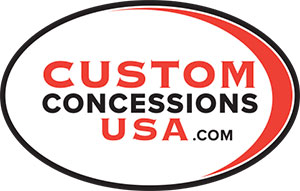
According to the US Bureau of Labor Statistics, there were over 2.5 million US worksite injuries in a single year in 2017. That translates into three employees injured at work per every 100 full-time workers in this country. As a food truck or food trailer employer, you too are legally required to compensate for medical expenses if an employee is injured while working in one of your vehicles.
In this post, you can learn about your responsibilities as an employer if there is an injury on your truck during work hours.
Workers’ Compensation Defined
Workers’ compensation guarantees that workers hurt on the job will receive payment to help cover their medical expenses. These laws exist in every US state so that employees won’t need to sue their company to help with medical reimbursements.
There are currently more than 140 million US workers covered by workers’ compensation insurance. The total cost for workers’ comp insurance to US businesses is well over $90 billion.
Workers’ compensation only concerns injuries that happen within the employer’s property. This property includes your food truck. In most states, under workers’ compensation statutes, businesses must secure a workers’ compensation insurance policy before they can start doing business.
These type of state regulations were first passed in 1902. By 1949, every US state had approved their own versions of workers’ compensation laws to protect their own employees.
Each state has their own version of workers’ compensation laws. That’s why you’ll find that these laws vary from state to state. There are also special compensation laws for employees in specific industries such as the railway industry or federal government workers.
Workers’ Comp Process Explained
Although all US states have their own individual workers’ compensation regulations, most workers’ comp claim procedures contain include some of these common steps:
Prevention
Prevention will be your best way to protect workers from injuries ever occurring in the first place. Create your own emergency response plan that spells out the importance of workplace safety and how to reduce risks.
These response plans can address various accident types that might occur and how to respond to them. You should also keep emergency contact information on file for each of your workers.
Coach your workers and supervisors on how to identify worksite hazards. Post 911 emergency contact information inside your vehicles for your employees to use if the need arises.
Act Immediately
Once you know there is an injured employee on your food truck, transfer the injured worker to a safe place. Direct your other workers to evacuate the dangerous area as well.
A fast response will reduce the severity of your worker’s injury. Your swift movement might also reduce how much the injury ends up costing your company.
Administer first aid to the injured worker. Always keep first aid supplies accessible on the vehicle at all times, and make sure your workers know where they are. If the injured food truck employee needs attention beyond any basic first aid, call an emergency medical crew to the site immediately.
Collect the Facts and Other Evidence
Evidence will play a central role in how the workers’ comp claim process evolves. Write down the important details about the injury incident that occurred. Take your own pictures of the equipment or area where the injury took place.
If there was a witness that saw the accident, collect their testimony as well. Collected updates periodically after the injury and keep them filed. These updates might be useful if your worker later notes delayed onset injuries.
All injuries should be documented even if your workers say that they feel fine. They may feel fine in the present moment, but later on, they might get medical attention if their condition changes. This documentation will also be important if they decide to file a workers’ compensation insurance claim at a later date.
Receive Your Employee’s Notification
If your employee was injured while you were away, ask them to submit a description of their sustained injury in writing. Some state workers’ comp statutes will have statutory deadlines for injured workers to inform their employer that they were injured.
When your employee notifies you about their accident, be sure the notification includes these following details:
- Accident time, date, and location
- How the accident took place
- Any other individual or witness involved at the accident site
- The extent of their injuries
- Status of any medical care they’ve received to date for their injuries
They will also need to have these details if they eventually decide to file a workers’ compensation claim.
Submitting a Workers’ Comp Claim
You can work together with your injured employee to file their workers’ comp claim with your business’s insurance provider. Your insurance provider might ask their own workers’ compensation physician to exam the injured worker. Another workers’ comp procedure includes mailing copies of the claim to workers’ compensation board of the state where the accident occurred.
When your insurance company and the workers’ compensation board are done reviewing the claim, they’ll contact the injured worker. They let the worker know if their claim is approved and what amount of reimbursement they will receive.
It will be in your own best interest to keep an open channel of communication between you and your injured worker. You should also be sure to maintain contact with the injured worker’s physician, claims adjuster, and insurance agent. This constant contact can help speed up the claims process, and allow the injured worker to receive the funds they need to pay for their treatments.
What Happens Next: Possible Outcomes
A worker can reopen their workers’ comp claim after it has been finalized if they believe they have good reason to request more compensation. If additional compensation is denied and your worker decides to sue, be helpful and transmit any pertinent information you might have to their attorneys or claims adjuster.
Being Prepared for an Injured Food Truck Employee
The ideal way to protect your workers and your business is to draft written documentation in advance that spells out your workers’ comp claim protocols. This documentation might also provide helpful guidance to your workers on your return-to-work policy. Give this information to all existing and new workers.
Keep your vehicles stocked with current first aid supplies in case someone is injured at work. If a workers’ comp claim is filed, stay helpful and cooperative as you and your employee navigate the process. Keep your cool and you can help protect your company from additional liability.
Want more food truck advice? Check out more blog posts here!
Thinking about starting a food truck? Request a free custom quote and one of our food truck specialists will help you design the truck of your dreams.
Stay up to date on everything Custom Concessions has to offer! Like us on Facebook and follow us on Twitter.
